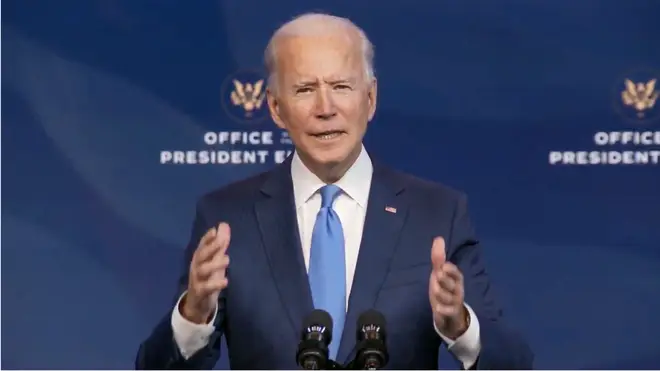
Matthew Wright 7am - 10am
14 December 2020, 22:38 | Updated: 15 December 2020, 00:44

President-elect Joe Biden has cleared the 270-vote threshold in the Electoral College count, formalising his presidential election victory, as Donald Trump announces that Attorney General William Barr has resigned.
The voting milestone came late on Monday as California electors affirmed the Democrat's massive five million vote win last month in the nation's largest state.
The Electoral College took on added importance this year because of Donald Trump's refusal to concede he lost his race for re-election.
California, the most populous state, delivered its 55 electoral votes, officially taking Mr Biden over the 270 votes needed to secure the White House.
Despite the electoral college confirming Mr Biden's victory, President Trump is not expected to accept the result.
When all of the states finish voting, Mr Biden is expected to lead Mr Trump 306-232. This is the same number of electoral college votes as Trump received in 2016.
On this, Mr Biden said: "At the time, President Trump called the Electoral College tally a landslide. By his own standards, these numbers represented a clear victory then. And I respectfully suggest they do so now."

What is Joe Biden like as a person? | What Next? with Lionel Barber
"In this battle for the soul of America, democracy prevailed," Mr Biden said in a speech to the American people following the result.
"We the people voted. Faith in our institutions held. The integrity of our elections remains intact. And so, now it is time to turn the page. To unite. To heal.
“Our democracy — pushed, tested, threatened — proved to be resilient, true and strong."
He renewed his campaign promise to be a president for all Americans, whether they voted for him or not, and said the country has hard work ahead on coronavirus and the economy.
He also spoke out the voter turnout, saying: "A number so big that this election now ranks as the clearest demonstration of the true will of the American people.
"One of the most amazing demonstrations of civic duty we've ever seen in our country. It should be celebrated, not attacked."
But there was no concession from the White House, where Mr Trump has continued to make unsupported allegations of fraud.
Read more: Game over for Donald Trump as US Supreme Court throws out final major election case
Read more: 'No evidence of widespread voter fraud', Trump's attorney general says
Just had a very nice meeting with Attorney General Bill Barr at the White House. Our relationship has been a very good one, he has done an outstanding job! As per letter, Bill will be leaving just before Christmas to spend the holidays with his family...
— Donald J. Trump (@realDonaldTrump) December 14, 2020
On the same night, Mr Trump announced that attorney general William Barr is to resign, effective "just before Christmas".
Mr Barr went to the White House on Monday, where Mr Trump said he submitted his letter of resignation.
"As per letter, Bill will be leaving just before Christmas to spend the holidays with his family," Mr Trump tweeted.
The president has publicly expressed his anger about Mr Barr's statement to the Associated Press earlier this month that the Justice Department had found no widespread election fraud that would change the outcome of the election.
Mr Trump has also been angry that the Justice Department did not publicly announce it was investigating Hunter Biden ahead of the election, despite department policy against such a pronouncement.
The president said deputy attorney general Jeff Rosen, whom he labelled "an outstanding person", will become acting attorney general.
Mr Barr in his resignation letter said he updated Mr Trump on Monday on the department's "review of voter fraud allegations in the 2020 election and how these allegations will continue to be pursued". He added that his last day in the job will be December 23.
Despite Mr Trump's obvious disdain for those who publicly disagree with him, Mr Barr had generally remained in the president's good graces and has been one of the president's most ardent allies.
Before the election, he had repeatedly raised the notion that mail-in voting could be especially vulnerable to fraud during the coronavirus pandemic as Americans feared going to polls.